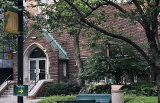Universities Begin Appointing Chief AI Officers to Coordinate Artificial Intelligence Efforts
By
Several major universities are creating a new executive role — the Chief Artificial Intelligence Officer — as higher education adapts to the sweeping influence of artificial intelligence in teaching, research and campus operations.
UCLA, the University of Utah, George Mason University and the University of Maryland–Baltimore County are among the institutions that have appointed inaugural CAIOs, according to Fortune and other reports. Chris Mattmann now serves as UCLA's Chief Data and AI Officer, overseeing campus governance and the ethical use of tools such as ChatGPT. At the University of Utah, Manish Parashar became the school's first CAIO in February, a move paired with a $100 million investment to expand AI research and infrastructure. George Mason University appointed Amarda Shehu as its first vice president and CAIO in 2024, while UMBC named Anupam Joshi to a similar role, guiding AI research partnerships and faculty adoption.
University leaders say the position is becoming critical as AI reshapes nearly every aspect of higher education. Beyond managing technology systems, the CAIO is expected to act as a connector across academic departments, ensuring that advances in AI are implemented responsibly and that faculty, students and staff are prepared to use new tools effectively. Advocates argue the role can help schools balance innovation with ethical concerns, while also keeping pace with peer institutions and industry partners investing heavily in AI.
The emergence of the CAIO underscores a broader shift: colleges are no longer treating artificial intelligence as an experimental add-on, but as a central force in shaping curriculum, operations and long-term strategy. With growing financial pressures, declining enrollment and increasing reliance on technology, universities say the position is not just about innovation but about ensuring they remain competitive in attracting students and research funding in a rapidly evolving landscape.
© 2026 University Herald, All rights reserved. Do not reproduce without permission.








